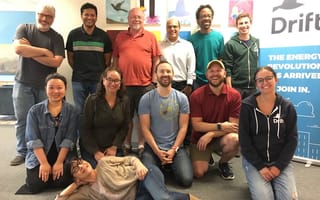As we venture deeper into 2019, the pace of technological change continues to accelerate. Entire industries are transforming almost in real time before our eyes, and it takes a savvy entrepreneur to keep up with it all. We spoke with leaders at three Seattle startups working in three very different industries — energy, cannabis and finance — about the changes and challenges they foresee in 2019, the role they have in those transformations, and what they’re doing right now to adapt.

Drift’s highly complex software optimizes the electric power supply chain, cutting out middlemen and connecting users with environmentally friendly energy sources. The company claims it can save users up to 10 percent off their current power bills, and it offers its services to both residential and corporate buildings.
Drift CEO Greg Robinson told Built In Seattle that 2019 is the year that renewable energy “goes mainstream.” We say that’s not a moment too soon.
What trends within your industry are you tracking in 2019, and how do they apply to your company?
1. We’ll be watching for the evolution of blockchain technology out of the hype cycle and into a business application phase. Blockchain technology is part of a bigger trend — a digital transformation of power — and Drift is at the forefront of this transformation.
2. Renewable power costs have come down significantly over the past two decades to a point that it can compete head-to-head with fossil fuels. This has led to 2019, the year that renewable power goes mainstream and is accessible and affordable for all. The only piece that was missing was a simple online set of tools to help environmental leaders and socially conscious people buy directly from renewable power makers. That is Drift.
We are building the tools that people and responsible brands need to build a world that runs on 100 percent renewable energy.”
3. Digitally-controlled battery storage is beginning to find its way onto power grids around the world, and this will make the trading of renewables very interesting in the next year or so.
4. As part of an overall process of de-commoditization in the power industry, we’ll see commitments to renewable power consumption coming from more and more companies, cities, states and countries.
How is your company contributing to move the needle in this arena?
We are building the tools that people and responsible brands need to build a world that runs on 100 percent renewable energy all day, every day.

As the cannabis industry moves toward the mainstream, it requires increasingly specialized and sophisticated tools to optimize various aspects of the industry. Seattle-based Headset, which raised $12.1 million earlier this month, builds data analytics software that helps product manufacturers, retailers and processors understand which products are finding success across various markets.
Headset CEO Cy Scott said his company’s software solution applies technology that has never been used in business intelligence tools before. He foresees a continued expansion of the legal cannabis industry.
What trends within your industry are you tracking in 2019, and how do they apply to your company?
The big trend in the cannabis industry in 2019 is expansion: new geographies and new participants. We're seeing cannabis legalization not only in North America but across the globe — with that comes a host of new opportunities. In 2019, we're going to see even more growth with traditional companies — consumer packaged goods, alcohol, pharma — entering the market. These new participants will have a demand for analytics, which is where Headset comes in.
We’re able to leverage new technologies, such as machine learning, to better support internal efforts and our customer-facing products.”
How is your company contributing to move the needle in this arena?
Just as the cannabis industry is new — without any legacy hangups — we too are a new analytics company. We’re able to leverage new technologies, such as machine learning, to better support internal efforts and our customer-facing products. The market and business intelligence we provide are helping these new organizations that are entering the market with the data to drive informed decisions, giving them a competitive advantage in a rapidly developing space.

Tomorrow’s mobile app helps family divide and conquer the big, scary decisions around life insurance, finances and legal wills. By breaking each facet down into manageable to-do lists, the platform helps families take a collaborative approach to large life events.
Among other strategies, Tomorrow CEO Dave Hanley and Head of Product Erik Berg are looking to differentiate their service through API-based partnerships with other startups.
What trends within your industry are you tracking in 2019, and how do they apply to your company?
Hanley: The financial services sector has bumped up against the efficient frontier of digital marketing, meaning that there will be little to be gained through advertising and offer optimization that will produce meaningful gross margin for commodity products, such as insurance and robo advisors. The next phase will involve finding adjacencies to your core business that allow a company to acquire customers and then sell your financial services to a portion of them.
We choose to integrate with companies that offer valuable products to our customers. ”
Berg: Tomorrow has been tracking the API-ification of fintech for a couple years now and looks for financial services companies that we can integrate with programmatically. We choose to integrate with companies that offer valuable products to our customers.
How is your company contributing to move the needle in this arena?
Hanley: The Tomorrow app’s free legal will provides real value to its customers with no strings attached, and when even a tiny percentage of customers purchase life insurance, our business model turns profitable. Instead of competing for the small number of Americans searching for life insurance quotes, Tomorrow will invest in its adjacent, free products and experiences in 2019, thus growing the overall number of people who will learn about life insurance — and purchase through its platform.
Berg: We’re developing API-based partnerships with startups like Ladder, which helps people buy life insurance instantly. After someone uses the Tomorrow app to make a free legal will, they can decide to buy life insurance through Ladder. Ladder’s product perfectly compliments what we offer and by packaging them up together, we make it easier for our users to protect their families.






